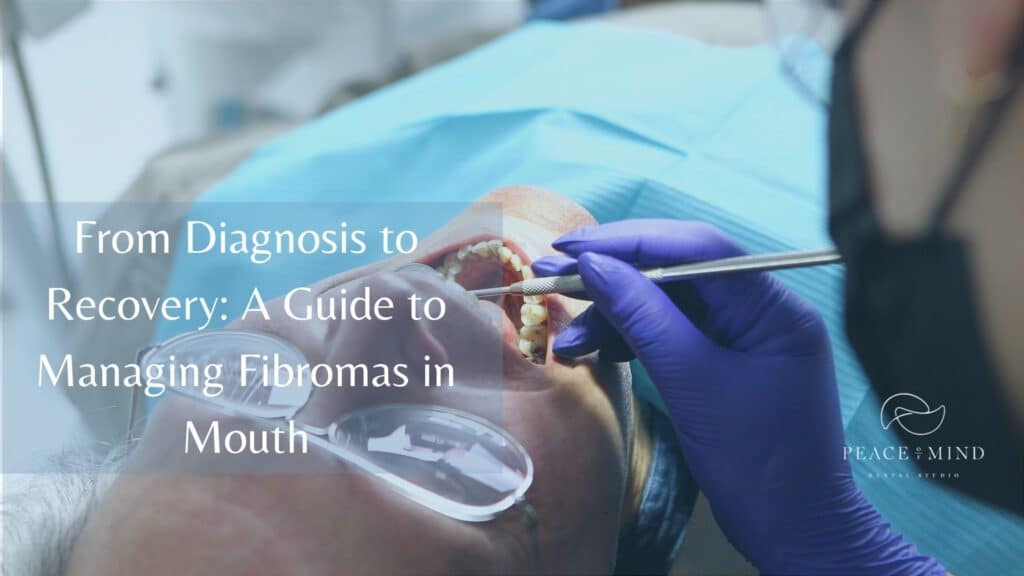
Can you feel a growth inside your mouth, which is painless but looks like a tumor?
If yes, it might be a fibroma.
Are you worried about what it is? Don’t, because an oral fibroma is not malignant.
To learn more about oral fibroma, read on, as this blog discusses the fibroma, its growth, its causes, and treatment in detail.
To learn more, contact us at Peace of Mind Dental Studio.
Understanding Oral Fibroma
Fibromas are benign growths of connective tissue in the mouth, which can be yellow, white, pink, or simply the color of the insides of your mouth. You can trace a fibroma in your mouth with your tongue, which is generally painless.
Fibromas develop due to connective tissue and can form anywhere on the body. So, oral fibroma is just a type of fibroma.
Buccal fibroma generally occurs where the upper and lower jaws meet. Trauma and injury are common causes of buccal fibroma. It is believed that the trauma caused by both upper and lower jaws biting down on the insides causes this growth.
Importance of Professional Diagnosis
“Since fibromas are benign, why should I see a doctor?”
A dentist must check the growth and see if it is indeed a fibroma, leukoplakia, or another dangerous growth.
A fibroma is painless, but if such growths are developing frequently in your mouth, it is advised to consult us at Peace of Mind Dental Studio to confirm that the growth is benign and nothing serious is present.
At Peace of Mind Dental Studio, we will conduct a dental examination. If it is indeed a fibroma, then medication is prescribed.
In some cases, a biopsy is prescribed if the growth imitates leukoplakia, which can be cancerous.
Exploring Different Types of Oral Fibromas
There are types of fibromas that you should learn about:
Irritation Fibroma
As the name suggests, this type of fibroma develops due to continuous irritation of the tissues, such as biting down on the underside of the cheek, cutting the same tissues during chewing, etc.
It is the most common type of oral fibroma.
Peripheral Ossifying Fibroma
It is a gingival fibroma, i.e., it develops on the gums. It develops from soft tissue and looks bright red. It is also a benign fibroma that affects younger patients popularly.
Giant Cell Fibroma
This type of fibroma is caused by a multinucleated cell or cells. It also affects the younger patients.
Oral Fibroma Removal Options
If this benign growth in your mouth is causing chewing and speaking issues, which is rare, then consulting us at Peace of Mind Dental Studio is advised. After examining the type and size of your fibroma, treatment is prescribed, which might include removal of the fibroma.
The procedures for oral fibroma removal are:
Surgical Removal
The most common way to remove a fibroma is to use a scalpel. A small incision is made, and the lump of tissues is removed. Considering the fibroma’s minute size, no stitches are required in many cases.
Laser Removal
If you are scared of scalpels, then laser removal of fibroma is a better option. A low-powered laser is used to remove the tissues. This method is advised to reduce bleeding and promote quicker recovery.
Cryotherapy
In cryotherapy, the fibroma is frozen with liquid nitrogen, which stops its growth.
Treatment and Aftercare of Fibroma
If you choose any of the above treatment procedures, here are the treatment and aftercare tips for quicker healing:
- You need medication for pain relief and help manage discomfort.
- After the procedure, try and eat soft foods, more beverages, and less spic food.
- Maintaining proper oral hygiene is advised.
Final Words
Oral fibroma is generally caused by trauma and injury to the mouth. Proper oral hygiene and regular dental examinations can prevent the growth of these benign structures.
Considering they are non-cancerous, many people overlook their presence, which leads to increased discomfort over time.
It is advised to seek immediate oral fibroma treatment if the frequency of the growth has increased.
At Peace of Mind Dental Studio, we provide timely and quality dental treatment. Consult us as soon as possible for oral fibroma.
Book an appointment now!
Frequently Asked Questions
Que: If I don’t get Fibroma diagnosed, can it lead to cancer?
Ans: No. Fibromas are benign and do not lead to cancer.
Que: Can oral fibromas go away on their own?
Ans: No. The tissue turns hard over time and requires removal, as it causes discomfort and interferes with regular oral functions.
Que: What should I do if my fibromas return?
Ans: Consult us at Peace of Mind Dental Studio to identify the cause of fibroma in your mouth. Based on it, we can suggest appropriate treatment.


